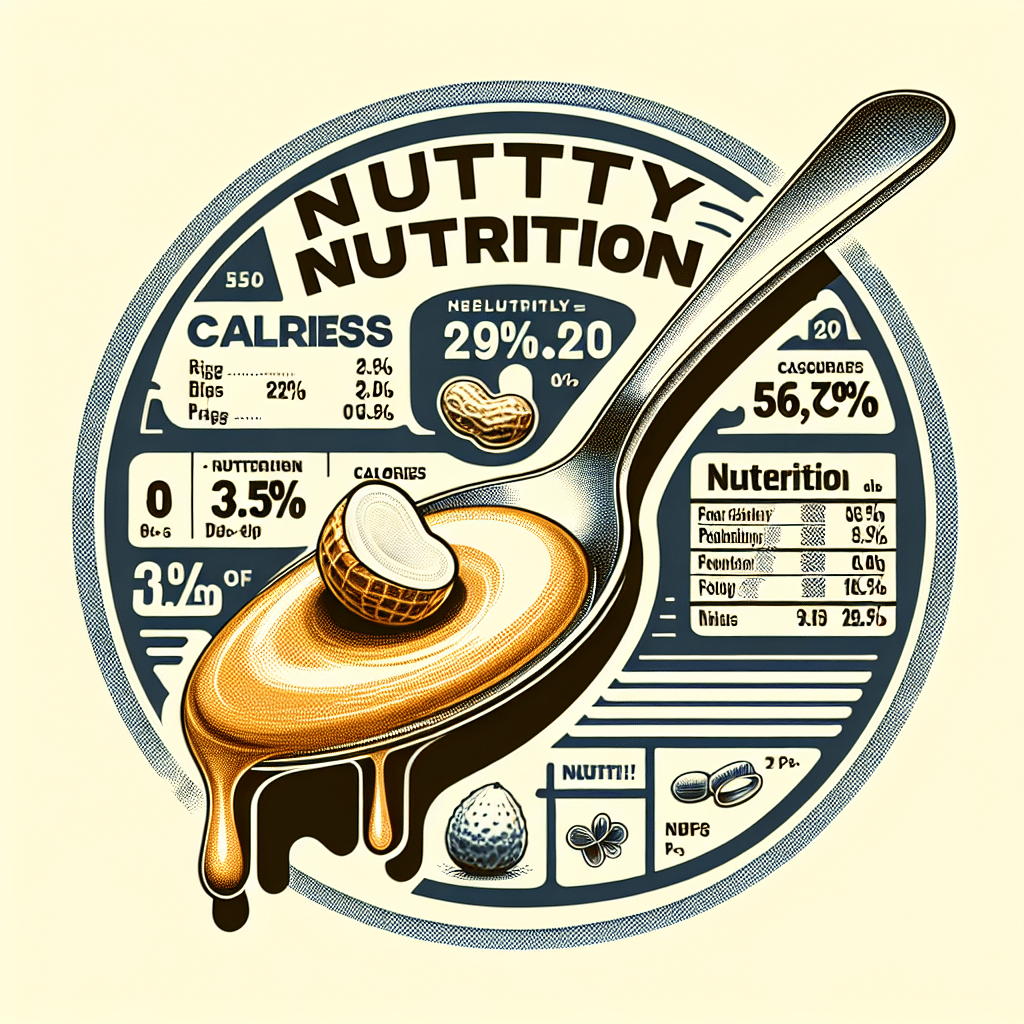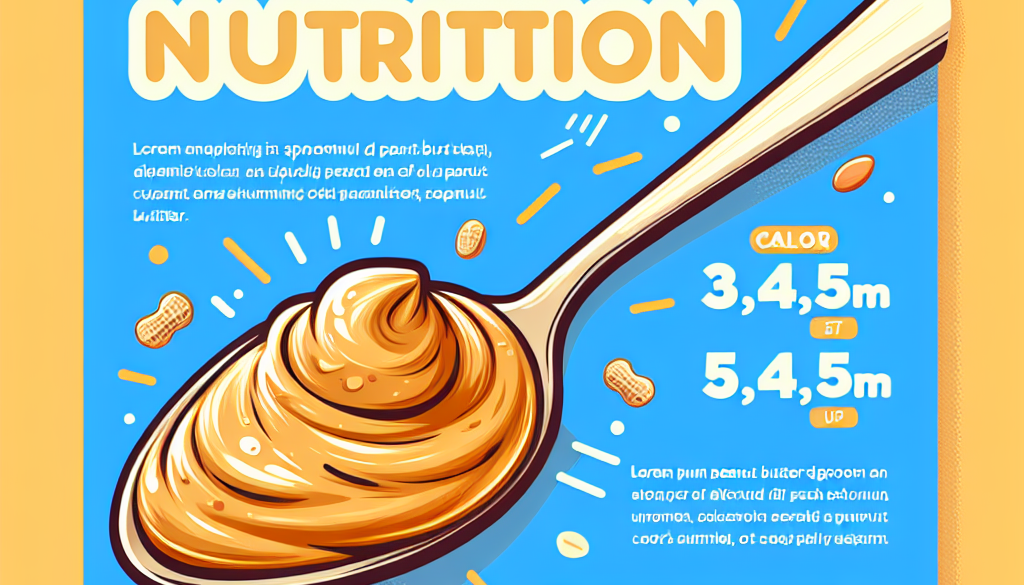How Many Calories Are in a Spoon of Peanut Butter? Nutty Nutrition
-
Table of Contents
- Caloric Content of Peanut Butter: A Nutritional Exploration
- Understanding the Caloric Density of Peanut Butter
- Nutritional Breakdown of Peanut Butter
- Comparing Different Types of Peanut Butter
- Health Benefits and Risks of Peanut Butter
- Integrating Peanut Butter into a Healthy Diet
- Conclusion: The Nutty Essence of Peanut Butter’s Calories
- Discover ETprotein’s High-Quality Protein Products
Caloric Content of Peanut Butter: A Nutritional Exploration

Peanut butter is a staple in many households, cherished for its creamy texture and rich flavor. But beyond its taste, peanut butter is also valued for its nutritional benefits, including its protein content and healthy fats. However, for those monitoring their caloric intake, understanding the energy provided by this nutty spread is crucial. In this article, we delve into the caloric content of a spoonful of peanut butter and explore its nutritional profile.
Understanding the Caloric Density of Peanut Butter
Peanut butter is known for being calorie-dense, meaning it contains a high number of calories relative to its volume. This is largely due to its high fat content, which is predominantly composed of monounsaturated and polyunsaturated fats. These are the “good” fats that can support heart health when consumed in moderation.
On average, a tablespoon of smooth peanut butter contains about 94 calories. However, this number can vary slightly depending on the brand and whether it’s a natural or processed product. Natural peanut butter, which often has a simpler ingredient list, typically contains around 90 calories per tablespoon.
Nutritional Breakdown of Peanut Butter
While calories are an important aspect to consider, the nutritional value of peanut butter extends beyond energy content. Here’s a breakdown of what a tablespoon of peanut butter typically offers:
- Protein: Approximately 4 grams
- Fat: 8 grams (with around 2 grams of saturated fat)
- Carbohydrates: 3 grams
- Fiber: 1 gram
- Sugar: 1-2 grams (varies by brand and type)
- Vitamins and Minerals: Vitamin E, magnesium, phosphorus, zinc, and niacin
These nutrients contribute to the overall health benefits of peanut butter, making it a valuable addition to a balanced diet.
Comparing Different Types of Peanut Butter
Not all peanut butters are created equal. The nutritional content can differ significantly between types and brands. Here’s a comparison to help you understand the variations:
- Natural Peanut Butter: Made with minimal ingredients, usually just peanuts and salt. It tends to have a lower sugar content and no hydrogenated oils.
- Processed Peanut Butter: Often contains added sugars, oils, and fats to enhance flavor and texture. These additions can increase the calorie count and decrease the health benefits.
- Reduced-Fat Peanut Butter: While it may have fewer calories from fat, it often contains more added sugars and fillers to compensate for the loss of flavor, which can affect the overall nutritional value.
When choosing a peanut butter, it’s important to read the label and consider the type that aligns with your dietary needs and goals.
Health Benefits and Risks of Peanut Butter
Peanut butter isn’t just about the calories; it’s also packed with health benefits when consumed in moderation. Here are some of the advantages and potential risks associated with peanut butter:
- Heart Health: The monounsaturated and polyunsaturated fats in peanut butter can help lower bad cholesterol levels and reduce the risk of heart disease.
- Weight Management: The protein and fiber in peanut butter can promote satiety, helping to control appetite and potentially aid in weight management.
- Energy Source: Due to its caloric density, peanut butter is an excellent energy source, making it a favorite among athletes and those with high energy demands.
- Allergies: Peanuts are a common allergen, and peanut butter can pose a risk for those with peanut allergies.
- Added Sugars and Fats: Some processed peanut butters contain unhealthy additives that can negate the health benefits if not consumed mindfully.
It’s essential to balance the benefits with the risks and choose a peanut butter that supports your health objectives.
Integrating Peanut Butter into a Healthy Diet
Peanut butter can be a nutritious component of your diet when used appropriately. Here are some tips for incorporating it healthily:
- Opt for natural peanut butter with no added sugars or hydrogenated oils.
- Measure your servings to keep track of calorie intake.
- Pair peanut butter with fruits, vegetables, or whole grains for a balanced snack.
- Use it as a protein boost in smoothies or oatmeal.
- Avoid excessive consumption, as the calories can add up quickly.
By being mindful of portion sizes and choosing the right type of peanut butter, you can enjoy its benefits without overindulging in calories.
Conclusion: The Nutty Essence of Peanut Butter’s Calories
In summary, a spoonful of peanut butter contains about 90-94 calories, with variations depending on the type and brand. While calorie-conscious individuals should be aware of this, it’s also important to recognize the nutritional benefits that peanut butter offers, including healthy fats, protein, and essential vitamins and minerals. By choosing the right type of peanut butter and consuming it in moderation, you can make it a valuable addition to a nutritious diet.
Discover ETprotein’s High-Quality Protein Products
If you’re looking to complement your diet with additional protein sources, consider exploring ETprotein’s range of organic bulk vegan protein and plant proteins. Their products, including organic rice protein, clear rice protein, pea protein, and more, are designed to meet various dietary needs and preferences. With a focus on quality and purity, ETprotein is a trusted supplier for consumers seeking to enhance their nutritional intake with plant-based proteins.
About ETprotein:
ETprotein, a reputable protein Chinese factory manufacturer and supplier, is renowned for producing, stocking, exporting, and delivering the highest quality organic bulk vegan protein and plant proteins. They include Organic rice protein, clear rice protein, pea protein, clear pea protein, pumpkin seed protein, sunflower seed protein, mung bean protein, peanut protein etc. Their offerings, characterized by a neutral taste, non-GMO, allergen-free attributes, cater to a diverse range of industries. They serve nutraceutical, pharmaceutical, cosmeceutical, veterinary, as well as food and beverage finished product distributors, traders, and manufacturers across Europe, USA, Canada, Australia, Thailand, Japan, Korea, Brazil, and Chile, among others.
ETprotein specialization includes exporting and delivering tailor-made protein powder and finished nutritional supplements. Their extensive product range covers sectors like Food and Beverage, Sports Nutrition, Weight Management, Dietary Supplements, Health and Wellness Products, and Infant Formula, ensuring comprehensive solutions to meet all your protein needs.
As a trusted company by leading global food and beverage brands and Fortune 500 companies, ETprotein reinforces China’s reputation in the global arena. For more information or to sample their products, please contact them and email sales(at)ETprotein.com today.












